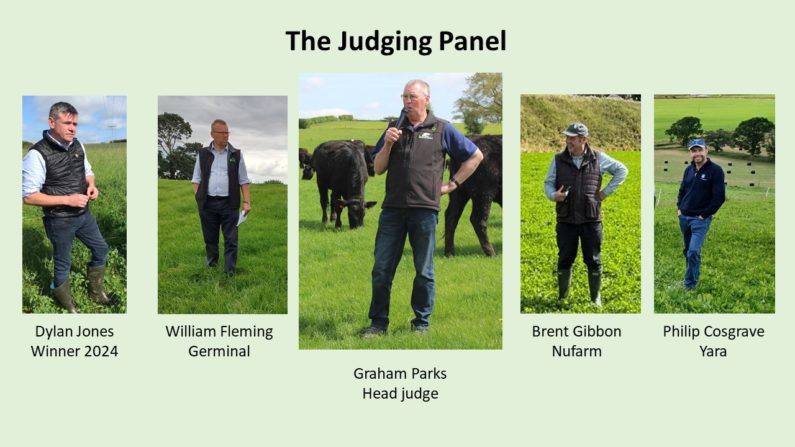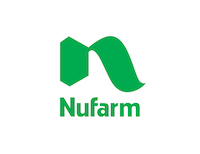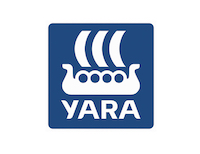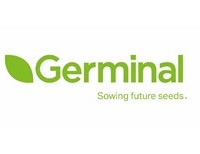Grassland Farmer Of The Year
Grassland Farmer Of The Year
Sponsors and Judges
Competition Sponsorship
The British Grassland Society is indebted to Germinal, Nufarm and Yara for generously sponsoring this competition. Each sponsor organisation provides a judge for the competition to work alongside a head judge and the previous year’s competition winner.

Meet the judges.
Graham Parks (Head Judge)
Graham runs a beef farm near Macclesfield in Cheshire, rearing and finishing beef calves from the dairy herd. Three age groups of cattle are run on 129 hectares, and sold finished at 24 to 32 months of age. Calves are purchased privately from two dairy farms. Good grassland management is a key component of the system. Graham started rotationally block grazing 20 years ago. The simplicity of his system is important to Graham. He runs the farm as a single-handed operation, working five days a week with additional help when required. However, he is always around when calf rearing. Good health and a good work-life balance are very important to Graham so that he can spend quality time with his family.
William Fleming (Germinal)
“Germinal are market leading forage and grass seed specialists producing high performance varieties for the agricultural and amenity sectors. Our product portfolio includes the internationally renowned Aber® High Sugar Grass (Aber HSG) range and a broad range of species including forage brassicas, clovers, chicory, plantain and maize. We have a research team embedded at the Institute of Biological, Environmental and Rural Sciences (IBERS) at Aberystwyth University, and an on farm Research Station in Wiltshire. Germinal leads research into sustainable farming practices while our progressive plant science programme of trials and development work provides valuable industry data on innovative forage species and cropping systems. We are proud to sponsor the BGS Grassland Famer of the Year competition highlighting best practice in grassland management”. William Fleming, Germinal GB Limited
To learn more about Germinal, please click here.
Brent Gibbon (Nufarm)
“The grassland team at Nufarm are delighted to sponsor the Grassland Farmer of the Year Competition. Nufarm is keen to help to identify exemplary grassland farmers whose management plan features a weed control strategy and who, in turn, would be able to help champion the benefits to all livestock producers and help them to make more milk and/or meat from quality grass, the cheapest form of feed”. Brent Gibbon, Nufarm
To learn more about Nufarm please click here.
Philip Cosgrave (Yara)
“Yara has long recognised that whether growing grass for grazing or looking to reduce feed costs through better silage management, choosing the right balance of nutrients applied at the right time plays a vital role in growing grass successfully – for both yield and quality.
This is why from a Research and Development Programme over many years we have developed a complete range of grassland fertilizers, management and timing advice to enable our farmer customers to balance the nutrient requirement of their grass. Quality fertilizers that provide the balance between what a farm has, and what the grass needs to deliver the yield and quality the livestock farmer wants – whether for dairy, beef or sheep – and whether for grazing or housed feeding.
We believe ‘if you can’t measure it you can’t manage it’ and soil and herbage analysis has a role to play in choosing the right fertilizer for the farm. This is clearly the ‘attention to detail’ philosophy held by members of the BGS and why we are particularly pleased to have the opportunity to be involved with the prestigious Grassland Farmer of the Year Competition”. Philip Cosgrove, Grassland Agronomist, Yara UK and Ireland.
To learn more about grassland at Yara please click here.
Dylan Jones (2024 Winner – Anglesey Grassland Society)
Dylan, and his father Wyn, farm just over 330 hectares and finishes 1500 beef steers per year. Cattle are bought in at 16-24 months of age weighing 420-480 kg. They are mostly Holstein, with some dairy crosses, and 95% of them are from the North Wales area. Around 100-150 of the cattle are weighed weekly and are sold when daily live weight gain (DLWG) falls towards 1.0 kg. The finishing period is 92 – 140 days with an average DLWG of 1.7 kg/day. They are sold at 630 – 680 kg with carcass weights of 310 – 380 kg.
The grazing platform is around 120 ha. Cattle graze from 25 March until the end of October at a stocking rate of 1.4-1.7 animals/acre. The farm is self-sufficient with barley and peas grown on the farm. These are crimped and fed to the beef cattle along with silages made from high protein grasses, red clover, and Westerwolds ryegrass on a multi-cut system. A typical rotation on the farm is winter barley, spring barley, then two to three year leys. Fertiliser use has been reduced through using legumes, and foliar nitrogen is used on grassland. Between 500-600 ewe lambs are bought in September-October. They are used as a grazing tool to clear surplus growth and encourage tillering. They are sold the following July-August for breeding. Carbon footprinting has been carried out on the beef production system on the farm and was shown to be very low. Dylan is active in promoting farming on social media, and also featured in a 2022 TV series on S4C that followed his work to move towards net zero on the farm.




